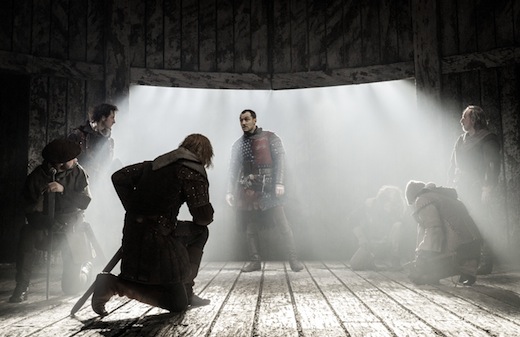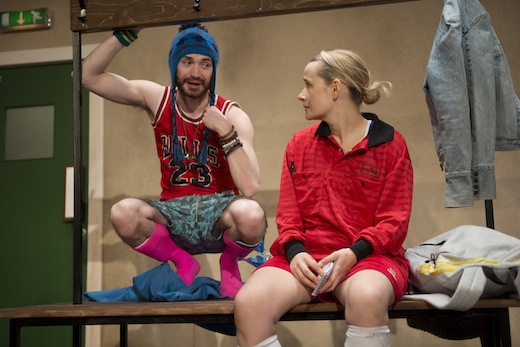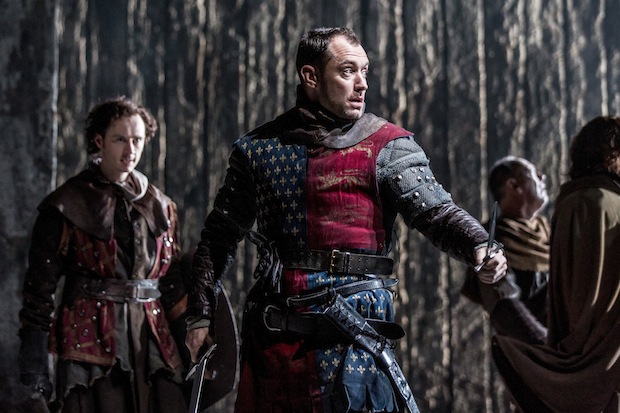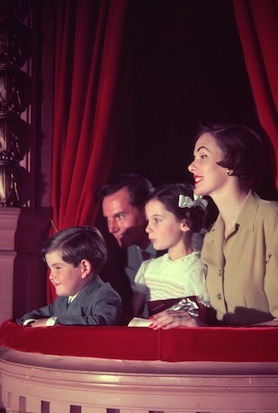Henry V is the final show in Michael Grandage’s first West End season. The theatre was full to bursting on press night. Jude Law, in the title role, had attracted a crowd of autograph hunters, who shivered outside the stage door. One was a tall, chubby young man in loose grey clothes wearing a bobble hat and a very kindly grin. His flies were undone. The play itself is a disjointed, rambling affair. Poorly shaped, and even a little artless, it’s crowded with fights, bloodshed and laddish humour. The scenes of brutality are offset by soaring passages of patriotic verse that have been quoted into overfamiliarity. There was much coughing and guttural distraction throughout the performance.
Grandage aims for handsome, elegant informality and here he scores full marks. Christopher Oram’s set is a broken squash court made from two fat walls, roughly whitewashed, which meet at the back. They open up to let in the battles. Simple and effective. The costumes underline class divisions. Infantrymen are done up like homeless crusties in Glastonbury daywear and Hobbit whiskers. The noblemen wear crisp, properly laundered gear: velvet trousers, padded tunics, discreet Celtic silver accessories. The whole lot might have been bought from a Carnaby Street outfitters in 1975 but the visual style suits the play’s medieval
temper.
 Jude Law as Henry V Photo: Johan Persson
Jude Law as Henry V Photo: Johan Persson
Law plays the king as a thuggish pragmatist. When he urges his soldiers to spare the defeated French peasants, he speaks as a prudent coloniser rather than as a forgiving saint. Law hasn’t Olivier’s rarefied, sacerdotal air, nor Branagh’s elusive bullishness. It’s a very blunt reading, everything is as it seems. He does the Crispin Day speech with Cockney accentations as if reaching down to the soldiery. The script calls for Henry to do a lot of standing to one side, listening. Law’s posture is so odd that he must have spent weeks refining and developing it with the help of several full-length mirrors. He assumes a pose of romantic cockiness, his weight eased backwards on one foot, his buttocks hoiked, his spine arched, his chin out-thrust, like a Dickensian bookie. Scarcely regal, but this king is a lairy buccaneer leading a stag-night raid across the continent. His prize is the French princess Katherine whom he woos in comically mangled Franglais. Law finds some tenderness and humour in this final scene. Jessie Buckley’s Katherine absorbs his aggressive chat-up lines in helpless, statuesque silence. Shakespeare has given her very little to do and Grandage appears to agree. Women are mere chattels and bargaining chips in this male-dominated play.
Beside Law, the supporting cast struggle to make an impact. Ron Cook plays Pistol like a frantic mosquito and invests so much zippy dynamism in the role that he misses the comedy. Noma Dumezweni is quietly forceful as Mistress Quickly but these burlesque roles lack sparkle without the presence of Falstaff, who wheezes his last breath off-stage in an early scene. Overall the show is a success but the role of Henry doesn’t play to Law’s strengths. He has the persona of a vicious angel, all truculence, anger, vanity and cruelty. He’d be a great Macbeth.
Jumpers for Goalposts is the new comedy from Tom Wells. His last play at this venue, The Kitchen Sink, won him a Most Promising Playwright award. And it featured a line that was quoted in virtually every review. A mopey student refuses to wear fashionably ripped jeans: ‘Life’s draughty enough.’ Say it in broad Yorkshire and you’ll grasp the essence of Wells’s talent. Like Alan Bennett, he excavates the dialects of the north and discovers gleaming troves of quirky comedy. The play follows a gay and lesbian football league composed of four teams. Tranny United, Lesbian Rovers, Man City and Barely Athletic.
 Jumpers for Goalposts: Andy Rush (Geoff) and Vivienne Gibbs (Viv)
Jumpers for Goalposts: Andy Rush (Geoff) and Vivienne Gibbs (Viv)
We’re led to assume that this exclusive system allows the footballers to play without fear of intimidation or abuse. But this isn’t stressed or even mentioned. Wells sets out to create touching characters, not to preach about social issues. The plot centres on the developing affair between nerdy, secretive Luke and breezy, upfront Danny. They date, they part. They date again. It’s enjoyable, if undemanding. The dénouement involving an HIV diagnosis feels a little stale for a play that is otherwise bang up to date. And Luke’s personality is so timid and puppyish that he risks becoming a computer code rather than a human being.
The play’s outstanding success is the character of Beardy Geoff, a witty, penniless busker who dreams of becoming a gay pop star. He’s played by Andy Rush, whom the gods have blessed with the full package of gifts: charm, humour, modesty, youthful good looks and a miraculous talent for naturalism. Around him, the others are acting. Rush is just behaving. He’s a joy to watch.
Got something to add? Join the discussion and comment below.
Get 10 issues for just $10
Subscribe to The Spectator Australia today for the next 10 magazine issues, plus full online access, for just $10.
You might disagree with half of it, but you’ll enjoy reading all of it. Try your first month for free, then just $2 a week for the remainder of your first year.














Comments
Don't miss out
Join the conversation with other Spectator Australia readers. Subscribe to leave a comment.
SUBSCRIBEAlready a subscriber? Log in